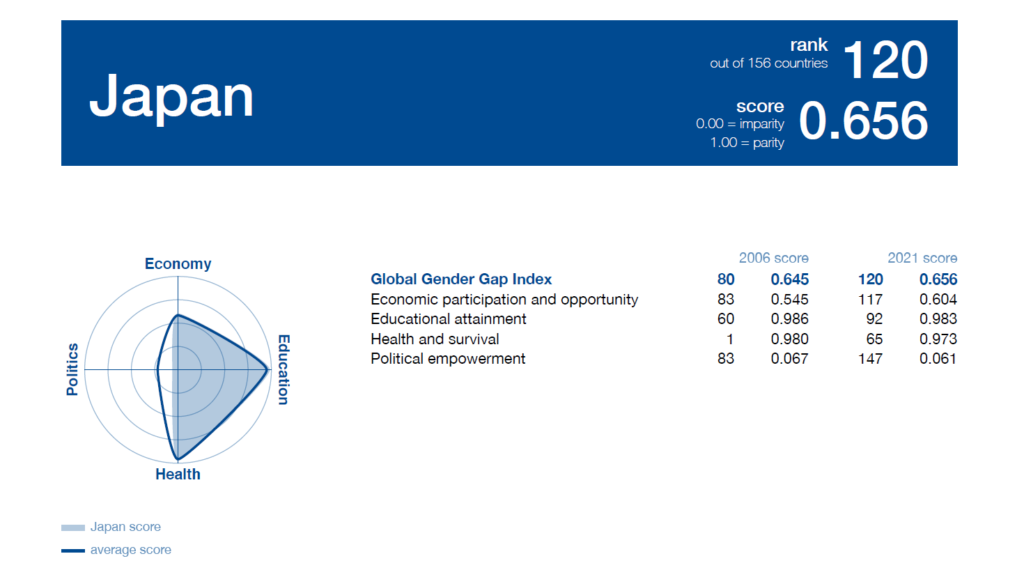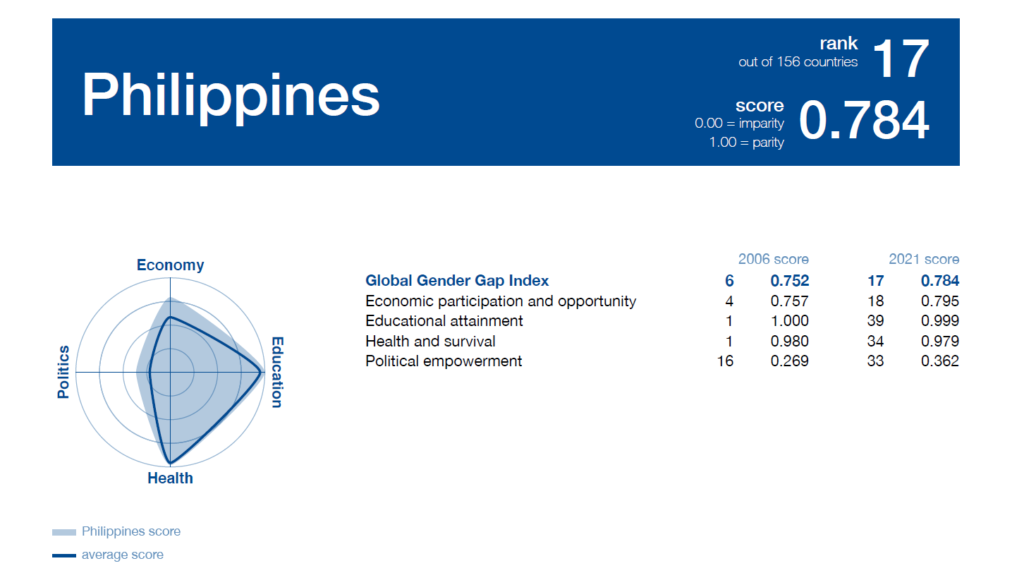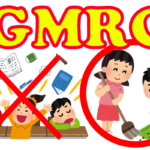
According to the "Gender Gap Report" released by the World Economic Forum, Japan ranks 120th out of 158 countries in the world in terms of the gender gap.
The report quantifies and ranks the gap between men and women in four categories: economic participation and opportunity, educational attainment, health and survival, and political influence.
The country with the least gender gap is Iceland, and the Philippines is ranked 17th, so it can be said that there is almost no gender gap compared to Japan.


| entry | Japan, Female | Japan, Male | Philippines, Female | Philippines, Male |
| labor participation | 72.8 | 86.7 | 49.1 | 75.2 |
| Annual income ($1,000) | 30.0 | 53.4 | 7.4 | 10.6 |
| Percentage of managers | 14.7 | 85.3 | 50.5 | 49.5 |
| Percentage of professional and technical | 51.2 | 58.9 | 61.5 | 38.5 |
| Higher School Enrollment | 96.9 | 96.3 | 71.3 | 60.2 |
| College Enrollment Rate | 48.8 | 51.2 | 40.4 | 30.8 |
| Health Age | 75.5 | 72.6 | 63.9 | 60.1 |
| Percentage of parliamentarians | 9.9 | 90.1 | 18.0 | 72.0 |
| Proportion of ministers | 10.0 | 90.0 | 13.0 | 87.0 |
| Number of years in the head of state (past 50 years) | 0 | 50 | 15.8 | 34.2 |
Comparing Japan and the Philippines, although the labor participation rate of women is higher in Japan, the percentage of women in managerial, professional and technical positions is higher in the Philippines.
There is an image that Philippine women are more hardworking and strong than their male counterparts, and the numbers confirm this.
The high percentage of Filipino women in professional occupations can be seen in the fact that the percentage of women who go to college is 10% higher than that of men.
Although there is little difference in the percentage of men and women who go to university in Japan, the problem can be seen in the fact that there is a difference in the percentage of men and women in managerial and professional/technical positions.
Although the number of women who quit their jobs upon marriage is decreasing compared to the past, according to a 2006 survey by the Ministry of Health, Labor and Welfare, 30% of women leave their jobs, and another 40% leave their jobs upon the birth of a child.
The number of women in managerial positions must be small, partly because women have shorter tenure than men.
On the other hand, in the Philippines, there are many people who take care of their children with their families or hire babysitters or maids, and there are probably many women who become managers because few women leave their jobs due to marriage or childcare.
When I was young, it was normal for women to leave the company upon marriage, and it was called "jubilee retirement.
After retirement, it was taken for granted that she would be a housewife.
It was a man's duty to provide for his family. Therefore, a "family allowance" is added to the salary after marriage, and the tax system and social security system are also based on this idea.
In the past, wages rose with age in a seniority-based system, so a woman could make a living on her husband's income alone, but recently wages have not risen as much as in the past, so many women continue to work after marriage.
One of the biggest social disparities between men and women in Japan is their participation in politics. The media in particular has highlighted Japan's backwardness in this regard.
The percentage of women in parliament and ministers is only 10%. In the past 50 years, no woman has represented the country.
The Philippines has had two female presidents in the past 50 years. This difference is huge.
I think there is a big difference in the public's awareness of politics in this area.
According to the World Values Survey, only 15.0% of the Japanese responded that politics is "very important" to them.
In the Philippines, 39.2% responded that it was "very important.
Since there are women among the heads of local governments, the appearance of a female prime minister may not be far off.
In Japan, there is a social and economic disparity between men and women, and women are at a disadvantage compared to men.
On the other hand, in a happiness survey, 34.8% of women say they are currently happy, while only 28.1% of men say they are happy. (Gender Equality Bureau, Cabinet Office)
When it comes to happiness, it seems that women are happier than men in Japan today.









